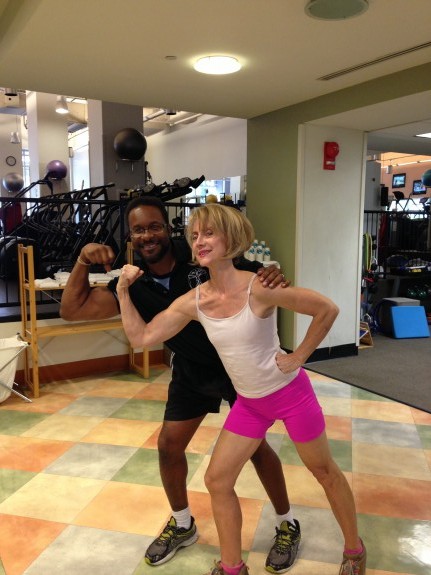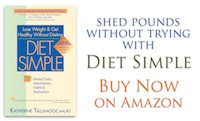4 Steps for Strengthening Muscles: Some Surprising News
- At August 21, 2013
- By Katherine
- In Articles, News
 14
14

I’ve been asked to share my personal regimen. Well, here it is – throughout the article, but also, look at the very end… Along with some personalized strategies for YOU!
One of my 50-something clients, who lost twenty pounds with a few “Diet Simple” tricks, increased pedometer steps, and weight training, confided in me that she feels sexy for the first time in years! On the tennis court, she performs better, is more flexible, stronger and quicker. Who could ask for more in your 40s, 50s, 60s – or even older?
My clients regularly ask me, “How do I maximize my workouts to gain muscle as quickly and effectively as possible?”
My answer: “What you eat and when you eat it profoundly improves your ability to build muscle mass and strength, and new surprising studies show an ancient beverage and a simple stretching routine can make a huge difference, too. Let me explain…”
1. Your Workout
While nutrition is important, the quality of your strength training workout is a key factor for building muscle mass. The National Institute on Aging recommends strength training all of your major muscle groups at least three times a week for 30 minutes. I encourage all my clients to get some kind of strength training so that when they lose weight, they not only look more toned and have more strength (who wants to be a flabby skinny person?), they’re healthier. This can be accomplished by working with a skilled trainer, but also through vigorous yoga and pilates – whenever there is resistance and you work your muscles to exhaustion – that is, you can’t do just one more pushup – you’re building muscle.
It’s also important to build muscle because the more lean muscle you have, the more calories your body burns because muscle mass increases metabolism. That’s why a man who weighs the same as a woman can eat so much more, and will lose weight more easily. He has relatively more muscle so he burns more calories, even at rest!
Studies of 80-year-olds show muscular strength can mean the difference between independence and a nursing home… it improves balance, walking, and reduces falls.
But it’s not easy to build muscle for a variety of reasons.
First, muscle mass declines as you age, starting in your mid 30s. An average person will lose five to seven pounds of muscle between age 35 to age 50 due to disuse. For every pound of muscle lost, you lose the capacity to burn 35 to 50 calories per day. That means if you’ve lost seven pounds of muscle by the age of 50, at 50 calories per muscle, that’s 350 calories you can’t eat just to prevent weight gain, let alone lose weight.
Second, weight loss causes muscle loss. When you lose weight, about half of what you lose is muscle -though you can minimize muscle loss by eating right (so read on!). This makes it even harder to keep the weight off because you’re reducing your muscle and therefore your metabolism as you lose pounds.
This brings us to the obvious: Building muscle as you age, eating the right kinds of foods to make that happen – and to minimize muscle loss as you lose weight – is essential to keeping lean.
Now for the nutrition…
2. Protein
Protein is essential for healthy living. It is one of the most important nutrients in the human body, second only to water. Bone health, muscle function, muscle strength, muscle mass and immune function — all are impaired with a low protein intake. But how much protein do we need?
New research has found that eating the right amount of protein – and at the right times – is essential not only for your health, but also for effective muscle gain and weight loss. Eating enough protein while losing weight is more likely to minimize muscle loss and maximize fat loss. Keeping muscle stores high is critical as losing muscle decreases resting metabolic rate, making it harder to maintain a healthy weight and lose body fat.
The National Academy of Sciences, in a recent report, recommended Americans eat at least 15% of their calories as protein but never exceed 35 percent, as that may be when adverse symptoms begin to appear (Low carb diets are often as high as 80% protein, and have many adverse health consequences).
If you’re losing weight or are worried about muscle or bone loss, consider increasing your protein.
How Much Protein? A personalized formula: The studies of aging populations find about 1.2 grams of protein per kilogram of (2.2 lbs is 1 kg) helps to reduce age-related muscle – and bone – loss. This amount should also be adequate for you to maximize your workouts, especially if you are in your mid-30s or older. Though some in the body-building community believe you can go as high as 1.6 grams of protein per kg of body weight. You may also need this higher amount if you’re sick or bed-bound to minimize muscle loss.
Example: So, if you weigh 150 pounds, this means the amount of protein you should eat is: 150 lbs (divided by 2.2 lbs per kilogram) = 68 kg; 68 kg X 1.2 grams of protein per kg of ideal body weight = 82 grams protein daily. For the maximum amount of protein, multiply 68 kg X 1.6 grams of protein per kg = 109 grams of protein per day
Where Do I Get Protein? Protein can be found in a wide range of foods. Animal protein is in seafood, lowfat dairy, poultry and eggs. Vegetarian protein can be found in legumes, soy, vegetables and grains. And while it’s true that high-protein foods often bring fat and calories along as uninvited guests, it doesn’t have to be that way. The lowest-calorie animal protein sources are the leanest. Go for seafood or poultry with no skin. Skim/lowfat milk, nonfat/lowfat yogurt, lowfat cheeses are also great options. Soy products also provide great low-calorie options and are high quality proteins similar to meat.
Toss four ounces of poultry or seafood or 12 ounces of spiced tofu into your salad and gain 28 grams of high-quality protein and no more than 150 to 200 calories.
8 ounces milk/yogurt: 8 grams protein
8 ounces Greek Yogurt: 20 grams
1/2 cup cooked beans/tofu: 8 grams protein
1 ounce fish/chicken/cheese (the leaner the meat, the more protein and the fewer calories): 7 grams protein
1 large egg: 7 grams protein
1/2 cup cooked or one ounce dry (1 slice bread) grain: 3 grams protein
1/2 cup cooked or one cup raw vegetables: 2 grams protein
3. Timing is Everything!
Eat a food or beverage high in protein (with some carbohydrate) 20 minutes before, and again, immediately after your strength training workout or after a vigorous cardiovascular workout, such as tennis, swimming, or kayaking, or even just a long walk. When you work out, you break down your muscles. Taking in protein when your muscles are being broken down and are metabolically active will build your muscle mass and strength more effectively. You also need to make sure you hydrate yourself properly!
My personal regimen includes drinking some skim milk before my workout – all you need is about 1/2 cup – and eating yogurt immediately after my workout or after yoga. If I forget the yogurt, I’ll run to the nearest coffee shop after my workout and buy a skim latte for my protein, which contains milk, or soy milk. But, I like yogurt the best: It contains important probiotics which keep your gastrointestinal tract healthy. It also contains high quality protein, carbohydrate, calcium, potassium and magnesium – important nutrients which you need to replenish your muscles. Eating immediately after your workout could have other benefits: It prevents the “extreme hungries” some people feel after heavy exercise, and it could prevent muscle cramps, according to a client who used to have muscle cramps regularly until she started eating yogurt after her exercise.
Current thinking among protein researchers is that protein is most bioavailable for your muscles (and your cells and organs) if eaten in relatively small quantities through the day. For women, 20 grams per meal is what the body can utilize efficiently. For men, that can go up to 30 grams per meal. So, with my personal protein goal being 60 grams per day, I’m sure to have about 20 grams in the morning, 20 grams mid-day and about 20 grams in the evening, as my body may not benefit from more at one sitting.
If you’re a man who needs 100 grams per day, you could spread out your protein intake through the day to 4 meals – separated by at least two hours – of about 25 grams each. So an 8 ounce steak at night, containing 56 grams of protein, just won’t cut it!
A new study found tea improves muscular strength. Tea? Apparently, as we age, oxidative stress and inflammation cause age-related muscle and bone breakdown. Tea’s healthy compounds, called “polyphenols,” reduce oxidative stress and inflammation, preventing this breakdown, and even improve muscular strength and bone mass. In a recent study funded by the National Institutes of Health’s National Center for Complementary and Alternative Medicine, when post-menopausal women with osteopenia (the beginning of osteoporosis – brittle bones) were given tea and/or Tai Chi exercises, after six months, the tea alone caused an improvement in muscle strength and bone-building biomarkers. Learn more about the health benefits of tea… So did the Tai Chi alone – certainly not a rigorous or impactful exercise, which we’ve been taught all along was necessary for muscle and bone building! Apparently, Tai Chi also reduces inflammation and oxidative stress.
With the amazing results of this study in mind, it makes sense that any foods high in anti-oxidants and anti-inflammatory compounds, such as fruits and vegetables, may help improve bone and muscle strength. And, if Tai Chi helps improve bone and muscle mass, shouldn’t other forms of meditation or meditative exercise, such as yoga? More research is needed to establish the facts, but these results certainly are promising.
See more specifics of my own personal regimen below!

KT walking in the’hood! In addition to some facts about my own regimen written throughout this article, read more about my personal regimen below… (Photo by Zach Lipson)
In the meantime, I’m drinking tea every day, doing vigorous yoga at least 2 to 3 times a week, working with a trainer once a week, walking A LOT to keep body fat down, at least 10,000 pedometer steps is a daily average, in my posture-improving MBT shoes, from Comfort One Shoe Store (ask for Manager, Shawn O’Neill), eating plenty of yogurt, and my own delicious batch recipes filled with healthy foods found in Diet Simple and Diet Simple Farm to Table Recipes (only $4.95) to keep my muscles and bones strong, and my body in shape!
For more fabulous tips and simple, effective ways to lose weight,
buy her book, Diet Simple!










Melina
Hi there, after reading this awesome article i am also glad to share my knowledge here with mates.
Katherine
Thank you so much! I’m glad to know!
94Ramon
Hello admin, i must say you have very interesting articles here.
Your blog should go viral. You need initial traffic only.
How to get it? Search for; Mertiso’s tips go viral
Vitamin D Boosts Muscular Strength, Power, Velocity, While … – The Georgetown Dish | Grocery unique depot
[…] said, we’ve known for years, and I’ve written about, the importance of working out, protein, and eating an anti-inflammatory, anti-oxidative diet […]
Candy
Right here is the right website for anyone who wants to find out about this
topic. You know a whole lot its almost hard to argue with you (not
that I personally would want to…HaHa).
You definitely put a brand new spin on a topic that’s been written about for a long time.
Great stuff, just wonderful!
Steven James
Great article. Like you said your workout is the biggest key to building strength and muscle. And over course, protein is essential as well.
The only thing I question is the timing aspect. I use to be all about have my protein shake right after my workout and all other the timing advice out there, but I’ve stopped using this advice and the results have been the same. I think the timing aspect is really overrated. As long as, you eat a high quality protein meal an 1 to 2 hours after your workout you’re fine. I can’t stand protein shakes anymore either, they are loaded with fillers and other bad ingredients. The only proteins that aren’t bad are incredibly expensive.
Its always a lot easier to just focus on getting high quality protein meals instead of having to worry about the timing aspects. Its a lot easier and you won’t lose any muscle.
Katherine
Thank you for your comments, Steven
Olivia
About tea……is decaffinenated OK too?
Katherine
Dear Olivia,
Thank you for reading and for your excellent question. I am not sure of the answer. It may depend on the process used to decaffeinate the tea, as some of the compounds in tea may not survive the process. That said, my guess is you’ll get some benefit from decaf tea!
Katherine
Olivia
About tea……is decaffeinated OK too?
Elizabeth Paulson
This is valuable information. I will make sure to utilize these techniques daily. Take care. Thanks. ep
Katherine
Dear Elizabeth, Thank you so much for reading and for you generous comments!
Lady J
Ms Katherine: what kind of tea do you recommend?
BlAck ? Green? And do you think Good old fashioned. Lemonade (Fresh lemons, mais oiu) is restorative and good for you?)
Katherine
Dear Lady J,
Thank you so much for reading my article. Ahhh, great questions! Concerning the best kind of tea, scientists have told me: Stick with the tea you enjoy most, whether white, green, oolong, or black. All impart major health benefits and the studies are not detailed or numerous enough to choose one over another, especially if you don’t enjoy it! “While fermentation causes green tea to become black, digestion may convert black tea back to green. So, they all may come out the same in the end (forgive the pun)! Regarding Lemonade: Of course, you are right that lemons – and citrus fruits in general -are great for you! That said, try to use as little sugar as possible when you make your home-made lemonade. I wouldn’t use the mixes or the store-bought kind, unfortunately, because of the high level of sugar and/or high-fructose-corn syrup.